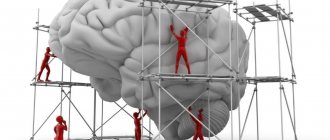Nihilism is a type of worldview in which a person denies social norms, orders and values. We can say that this is a philosophy and way of life of a person. Perhaps now you thought that we would talk about antisocial individuals, vandals, hooligans, drunkards. No. Although all of this is a manifestation of nihilism, there are other, more attractive examples. And the concept itself is much more complex and broader. Let's take a closer look at what nihilism is and who a nihilist is in simple words.
Definition of the concept
Nihilism - what is it and what is the meaning of the word? It is derived from the Latin nihil, which translates as “nothing.” Nihilism is the denial and destruction of existing norms, systems, and order in society. The phenomenon has been studied and continues to be studied in philosophy, history, sociology, and psychology. And in different sciences this concept is given different definitions:
- Nihilism in history is the denial of all norms, principles and laws created by humanity, complete skepticism.
- Nihilism in literature is a manifestation of nonconformism, the desire to go beyond the system, the usual way of life.
- Nihilism in philosophy is the denial of generally accepted norms, values, ideals, culture, etc.
- Nihilism in psychology is a defense mechanism of the psyche, in which a person seeks to destroy the world so that it does not destroy it.
History of origin
Nihilism was first discussed in the Middle Ages. This was the name of the doctrine that rejected the human nature of Christ. The concept later became popular in Western philosophy. At first it was also associated with religion, and then nihilism began to be understood as a philosophy of life, according to which life itself has no meaning. The problem was studied by F.G. Jacobi, S. Kierkegaard, F. Nietzsche, O. Spengler, M. Heidegger.
In psychology, nihilism began to be studied after it separated from philosophy into an independent science (1876). E. Fromm and W. Reich made a special contribution to the study of the problem. Fromm believed that nihilism is a defense mechanism of the psyche. Faced with problems of adaptation and self-realization, a person seeks to destroy the world so that it does not destroy him. Reich viewed nihilism as a character neurosis and a defense mechanism.
The spread of nihilism in Russia is more connected with literature. It was there that this phenomenon was described in as much detail as possible. This concept was first used by N.I. Nadezhdin in the article “The Host of Nihilists” (1829). In the second half of the 19th century in Russia, those who denied religion and moral standards and wanted to destroy the existing social system were called nihilists. As a rule, it was about revolutionaries. In Western literature, the term “nihilism” was even used to describe the Russian revolutionary movement.
Note! Nihilists strive to destroy previous foundations, but do not offer anything in return. A nihilist is one who denies and criticizes, but offers nothing.
Nihilists in literature
Nihilism in Russian and foreign literature has become very widespread:
- I. S. Turgenev “Fathers and Sons.” The novel shows the ideological struggle of several generations of people. The work is recognized as a classic and still excites people’s minds.
- N. Chernyshevsky “What to do?” The book raises a rhetorical question that is still relevant today. By the way, they still haven’t found an answer to it.
- Friedrich Nietzsche “The Ethics of Egoism “There is nothing higher than me.” A book by a German philosopher that reflects the trends of nihilism, postmodernism, and existentialism.
- Maxim Liepkais "The Man in Pink". The book is about an ordinary Russian schoolboy who really wants to find himself, but everywhere he turns out to be superfluous.
- Ray Bradbury "Faringate 451" Human society is sliding into the abyss, and with it culture, traditions, and experience acquired over centuries.
- F. M. Dostoevsky “Crime and Punishment.” A novel about a crime that happened due to mental shock. The main character throughout the book will search for answers to the most terrible questions.
- Ch. Palahniuk “Fight Club”. This is a unique book through whose lips an entire generation speaks.
What books about nihilism have you read? Share your reading experience and thoughts about what you read in the comments. Let's put together a cool selection.
Watch a video about the origins and development trends of nihilism in literature.
Characteristics of a nihilist
Who is a nihilist? Let's describe it briefly. This is a person who denies any norms, rules and values. This is a skeptic, a cynic, a critic, an egoist who focuses only on the material and physical. No one and nothing is a decree for him. He denies the very structure of the world. A nihilist always maintains a sober mind and does not give free rein to emotions and feelings. He is sure that social foundations, norms and orders limit his freedom and interfere with his life.
A nihilist can unite with people like him. But at the same time, all together they exist as if autonomously from society. They create their own world where outsiders are not allowed. There are no authorities or leaders in this group. There no one obeys anyone, no one admits warm feelings to anyone. These people unite to stand together against the whole world. And they demonstrate their disgust, contempt, and disdain through sarcasm, provocations, caustic jokes, ridicule, and impudent antics.
Causes
As we have already noted, from the point of view of psychology, nihilism is a defense mechanism of the psyche. And, like many problems, it has its roots in childhood. Nihilism is associated with a person’s non-acceptance and misunderstanding of himself, as well as with distrust of the world. This, in turn, is caused by distrust of parents. Probably, in childhood, the nihilist encountered an authoritarian style of family education or overprotection. That is, a person is accustomed to the fact that he was not loved, suppressed, forced. This gave rise to aggression, anger, and coldness in him. However, at the same time, every person has a living need to join society. Such a contradiction further fuels the internal conflict of the nihilist.
Interesting! The problem of public and personal, preservation of individuality and self-realization in society is one of the most difficult problems in psychology. Not all people can be free, preserve and express their uniqueness within the system, while maintaining identity with some group.
Pros and cons of nihilism
Nihilist views and positions can be regarded as a twofold phenomenon. It has a number of both pros and cons.
Pros of nihilism:
An opportunity to find your individuality and express it to the world.
The opportunity to insist on your own, to defend the value of your opinion.
The likelihood of conquering new horizons and making discoveries.
Inability to join generally accepted values.
Cons of nihilism:
Categorical judgments that cause harm, first of all, to the person himself.
The inability to change your mind, admit that you were wrong, or step over your own views and foundations.
Dislike, misunderstanding on the part of people around.
The essence of nihilism
The essence or philosophy of nihilism (principles and beliefs, features of the thinking of a nihilist):
- there is nothing that cannot be seen or touched (for example, a nihilist is sure that there is no God until the contrary is proven);
- there is no objective morality and morality - only a subjective vision of the world;
- there is no meaning or truth in life, so no one thing can be considered as the most preferable.
A nihilist will never believe in anything just like that; he needs a logical explanation, facts, reasons. He will not believe in something until there is irrefutable evidence of its existence. The nihilist denies everything that can be denied. He stands for complete freedom from faith, rights, frameworks, norms, values, society, family, power, etc. Manifestations of nihilism may change, as well as the understanding of this phenomenon, but the phenomenon itself will never disappear.
Nihilist and nihilism - meaning
The meaning of the word "nihilist" is defined as the denial by an individual of certain things, such as the meaning of personal existence, the presence of authorities and the worship of religious idols.
The lexical meaning of the word “nihilist” implies a certain person who is a supporter of radical democratic reasoning and expresses his rejection of generally accepted laws, rules and traditions.
In modern society, the meaning of the word nihilist has acquired a deeper and broader meaning. But the views and beliefs of such people have not changed as before. Nihilists of the 21st century also adhere to worldviews that allow them to question the rules and standards of society, and also deny any ideals, moral and ethical norms and natural forms of social existence.
Nihilist principles
The direction within which nihilistic principles are adhered to has acquired the name nihilism.
This movement characterizes a way of thinking and life that implies non-acceptance of everything. A more specific meaning and its manifestation in a given situation depends on the specific circumstances and time frame. In most sources, nihilists are characterized as negative and negative individuals. According to the majority, these individuals are constantly in a state of protest and rebellion, who are not happy with the established rules and laws of society. Supporters of nihilism are found in many areas of society. Each participant in the movement denies the direction that is convenient for him: politics, culture, religion.
The first mention of nihilism appeared in the Middle Ages by Alexander III. German philosopher F.G. Jacobi also used the term nihilism.
It is also known that Nietzsche was a nihilist. He adhered to a statement based on the denial of God and the failure of Christianity as a religion.
A nihilist, if only he is logical, doubts the existence of his interlocutor and is not sure of his own existence. Victor Hugo. Les Miserables
Traditional nihilism is the basis for the emergence of deeper and new types of this trend. Participants in the nihilistic movement are not always unanimous in their reasoning and conclusions. Even more disputes arise between society and representatives of nihilism. Ordinary members of society cannot understand nihilists and their beliefs.
It is even more difficult to understand a nihilist who does not accept any interaction and does not believe in anything. Nihilists have a hard time understanding a society that idealizes and gives meaning to things without good reason. With their protest they are trying to prove that the existence of the world does not depend on people and their ideals. The world and the universe functions separately from everything and does not need cultivation and worship.
Thus, nihilism is characterized by a worldview that is based on progress and rationality.
Kinds
Types of nihilism in modern society:
- social is the denial of norms, morality, rules, stereotypes;
- legal is the denial of laws, the regulatory framework of society;
- moral nihilism or ethical is the denial of morality and morality due to the inability to justify the evil and injustice of the whole world;
- cultural is the negation of culture, the creation of subcultures;
- youthful or demonstrative nihilism is the desire of a teenager to express himself, to stand out from the “gray mass”;
- mereological is the negation of something whole, unified.
There are other types of nihilism, for example, political, cosmic, existential. You can name even more types, the essence is one – denial, non-acceptance. Only the subject of negation changes. A common feature of all forms and types of nihilism is a rejection of the norms accepted in society.
Separately, it is worth noting positive nihilism. In short, its essence is this: we are all going to die anyway, so let’s have fun, enjoy ourselves and live the way we want. After death, it won't matter what you did right or wrong, so why not give up all these rules and regulations right now?
What is nihilism and the history of its origins
Nihilism in simple words is nothingness, emptiness, the destruction of the ideals of previous generations, the denial of moral and moral principles.
Filling the void is not among the interests of nihilists, therefore their philosophical ideas are negative in nature, since they do not offer anything in return . Nihilism flourishes on the basis of the devaluation of life, the loss of its meaning and purpose.
“Nihilism is a pose, not a doctrine.” Carlos Ruiz Zafon. "Angel's Game"
V. Dahl in his dictionary gave a succinct and witty definition of nihilism:
“...an ugly and immoral teaching that rejects everything that cannot be touched.”
The term “nihilism” (from the Latin nihil - nothing) came from the Middle Ages, as in the 12th century they called one of the heresies that denied the divine-human nature of Christ.
The word itself has been used in European languages since the 18th century to mean the denial of norms accepted in society. Friedrich Heinrich Jacobi introduced this term into philosophy in 1799 in his work “Sendschreiben an Fichte”.
Famous nihilists
There have always been those who criticized or supported nihilism. Famous representatives of nihilism among philosophers, psychologists, writers and revolutionaries:
- M.A. Bakunin - Russian thinker and revolutionary anarchist;
- P.A. Kropotkin - Russian revolutionary anarchist;
- DI. Pisarev - Russian publicist and literary critic, translator, democratic revolutionary;
- E. Fromm - German philosopher;
- Nietzsche is a German psychologist.
Some researchers classify V.I. as a nihilist. Lenin.
How to get rid of nihilism
Do we need to get rid of nihilism? If we view this as a defense mechanism, then yes, it needs to be dealt with. Excessive rationality, suppression of feelings and emotions are dangerous for burnout, depression or the development of other mental disorders. In addition, a nihilist cannot fully realize himself in society. The individual cannot develop outside of society, and nihilists do everything to get out of society, to destroy it, to destroy the system.
How to get rid of nihilism:
- Admit the problem. Analyze and make a list of what nihilism deprives you of.
- Remember when disgust for the world first arose. Determine the approximate cause of your condition.
- Know and accept yourself, see the uniqueness of each person. Do you believe science? Stock up on research, books on psychology and study the problem of abilities, inclinations, and temperament. We are not such biorobots, although in many ways this is true.
- Determine the main unsatisfied (frustrated) need. Think about what tools you lack and how to get them in society.
- Find what is valuable to you, come up with your “before and after story” (Mark Manson's definition). What does it mean? For example, this could be raising a worthy citizen of society, writing a book, creating your own school or courses, developing your own website or writing a column in some magazine. I think that every person is a nihilist in some way, but at the same time everyone can find what they like in our society.
Often getting rid of nihilism involves working with childhood traumas. Not all people are ready and able to make this journey on their own. As motivation, remind yourself often that trying to destroy the world is trying to protect yourself before the world destroys you. So what or who are you actually protecting yourself from? What is still meaningful and alive to you? You are disingenuous when you say that you live only according to the laws of reason. Something makes you angry, afraid, hate. What is this?
History and examples
The doctrine of nihilism existed in the Middle Ages. It rejected the humanity of Jesus Christ. The term was introduced into Western philosophy by the German writer Friedrich Heinrich Jacobi in 1799, describing it in his work Sendschreiben an Fichte. The essence of nihilism here was the denial of the meaning of life.
The heyday of nihilism occurred in the second half of the 19th century. The ideas of Friedrich Nietzsche, Arthur Schopenhauer and Oswald Spengler were permeated with nihilistic views. We can say that it was these great minds that developed and interpreted this direction of philosophy.
However, their fellow countryman Max Stirner, a thinker who substantiated a nihilistic attitude to morality, is considered the first radical nihilist. He argued that any morality is a ghost that must definitely be gotten rid of. He called selfishness an unconditional good, and he considered the solution to the problem not even revolution, but crime, murder.
Schopenhauer had much less harsh views. He considered life meaningless and full of suffering and boredom. He saw indifferent contemplation as the only way to understand the world.
According to Spengler, nihilism is the speculation of tired city dwellers who have nothing good ahead of them.
Read on our blog what society is.
Nihilism according to Friedrich Nietzsche
The position of Friedrich Nietzsche deserves special consideration. In his diary, he described two types of nihilism: active and passive. Nietzsche said that such a state appears when the highest values lose their value.
For example, in his opinion, people often endow truth and justice with excessive power and attribute supernatural properties to these values. People are confident that truth liberates and that justice will prevail. And when hopes are not justified, that is, the truth does not liberate, and justice does not triumph, disappointment comes.
But instead of admitting our errors in judgment, we begin to reproach the values themselves. It is then that a person decides whether to become an active or passive nihilist:
- An active nihilist rejects values imposed on him and creates his own.
- The Passive continues to believe in traditional ideals despite doubts, preferring not to take risks and hold on to safety.
Nietzsche argued that the position of a passive nihilist is much more dangerous, since blind faith for its own sake inevitably leads to a superficial life and meek acceptance of everything that others believe.
More than 100 cool lessons, tests and exercises for brain development
Start developing
Russian nihilists
Among the most famous representatives of Russian nihilism of the 19th century are the thinker and revolutionary Mikhail Bakunin, geographer and revolutionary anarchist Peter Kropotkin, critic and publicist Dmitry Pisarev.
Unlike Western ones, our nihilists decided to rely on Darwin's theory. They declared that man is an animal, and therefore must live according to the laws of the struggle for the existence of the species.
In Russian literature, the term “nihilism” was first used by Nikolai Ivanovich Nadezhdin in his article “The Host of Nihilists” in 1829. Sociologist V.V. Bervi-Flerovsky also mentioned it, equating this concept with skepticism.
Bazarov's Nihilism
Turgenev’s novel “Fathers and Sons,” published in 1862, truly made the word “nihilism” popular. One of the main characters is the nihilist Evgeny Bazarov. Its prototype was a young provincial doctor, whose ideas made a strong impression on the writer.
Bazarov is a harsh and unceremonious person, he opposes himself to everything and everyone, views people exclusively as a biological species, denies spirituality, generally accepted ideals and the “old school” of his fathers, believes only in science.
Turgenev admitted that he sympathized with the hero and sincerely tried to understand how this philosophy originates in a person. At the same time, he did not share Bazarov’s nihilistic views.
After Turgenev’s novel, Russian literature began to be filled with new nihilistic heroes, both positive and negative. This term began to be used to describe everyone who goes against the noble-serf-serf norms of building a society of that time.
You might be interested in knowing what romanticism is.
An example of nihilism
You can find many examples of nihilism in literature. One of the brightest nihilists of literature is Bazarov from the work of I.S. Turgenev "Fathers and Sons". Few people know that the writer was inspired to create such an image by a real person - a doctor whom Turgenev had the chance to meet.
What kind of person is this - Bazarov:
- he argues with everyone and always, puts himself in opposition to everything;
- he doesn’t care what others think about him;
- he does not choose his words, does not try to be tactful or affable, friendly;
- he denies all social orders.
He calls art, religion and philosophy rottenness and stupidity. For him there is only one authority - science. Neither faith nor people interest him. He treats humans exclusively as a biological species and believes that all people are the same. He does not believe in love, the soul and is not subject to emotions. He is always guided by reason.
As it later becomes clear, Bazarov lives in conflict with himself, family and society. On the basis of this, his attitude to the world, his philosophy of life arose.
Types of nihilism in modern life
Nihilists and their views in modern life have become isolated and formed into various varieties.
| A type of nihilism. | Description. |
| Meteorological. | Objects consisting of any parts do not exist. |
| Metaphysical. | Objects that exist in reality may well not actually exist in it. |
| Epistemological. | Adherents deny the need for processes of knowledge, cognition, and intellectual development. |
| Moral, ethical. | No thing in the world can be completely moral or immoral. |
| Legal. | Denial of the rules of behavior that the state sets before the individual. |
| Religious. | Nihilists reject religion and sometimes even rebel against it. |
| Geographical. | Misunderstanding, incorrect use of geographical directions. Parts of the world, geographical directions, concepts are replaced. |
| Youthful. | Youthful nihilism is very similar to teenage maximalism. A person is looking for himself, denial of something is accompanied by ardor and very vivid emotions. |
| Cultural. | Denial of the influence of culture on social life. Supporters believe that only such a cultural phenomenon as the avant-garde needs to be preserved. |
| Social. | Non-acceptance of the way of life, values, social norms, disagreement with political decisions and government institutions. |











